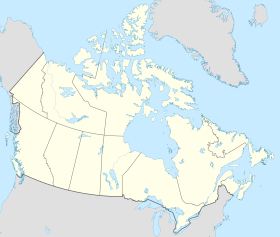Nova Scotia
Nova Scotia (/ˈnoʊvə ˈskoʊʃə/ NOH-vuh SKOH-shuh); French pronunciation: [nuvɛl‿ikos]) is a small province found on the east coast of Canada. The name "Nova Scotia" is Latin for "New Scotland". The capital and largest city is Halifax.
Nova Scotia
| |
|---|---|
|
| |
| Motto(s): | |
| Coordinates: 45°00′00″N 62°59′58″W / 45.00000°N 62.99944°W | |
| Country | Canada |
| Confederation | 1 July 1867 (1st, with Ontario, Quebec, New Brunswick) |
| Capital | Halifax |
| Largest city | Halifax, Nova Scotia |
| Largest metro | Halifax County, Nova Scotia |
| Government | |
| • Type | Constitutional monarchy |
| • Body | Government of Nova Scotia |
| • Lieutenant Governor | Arthur LeBlanc |
| • Premier | Tim Houston (PC) |
| Legislature | Nova Scotia House of Assembly |
| Federal representation | Parliament of Canada |
| House seats | 11 of 338 (3.3%) |
| Senate seats | 10 of 105 (9.5%) |
| Area | |
| • Total | 55,284 km2 (21,345 sq mi) |
| • Land | 52,942 km2 (20,441 sq mi) |
| • Water | 2,342 km2 (904 sq mi) 4.2% |
| • Rank | Ranked 12th |
| 0.6% of Canada | |
| Population (2016) | |
| • Total | 923,598 [3][4] |
| • Estimate (2020 Q4) | 979,115 [5] |
| • Rank | Ranked 7th |
| • Density | 17.45/km2 (45.2/sq mi) |
| Demonym(s) | Nova Scotian, Bluenoser |
| Official languages | English (de facto)[6] |
| GDP | |
| • Rank | 7th |
| • Total (2016) | CA$42.715 billion[7] |
| • Per capita | CA$44,931 (12th) |
| HDI | |
| • HDI (2018) | 0.895[8] — Very high (11th) |
| Time zone | UTC-04:00 (Atlantic) |
| Postal abbr. | NS |
| Postal code prefix | |
| ISO 3166 code | CA-NS |
| Flower | Mayflower |
| Tree | Red spruce |
| Bird | Osprey |
| Rankings include all provinces and territories | |
People who live in Nova Scotia are called Nova Scotians. There are over 900,000 of them; over 400,000 of whom live in Halifax.
What is now Nova Scotia used to be controlled by the Mik'maq. The French settled among them at Port Royal after 1600, and called the land part of Acadia, with Port Royal as its capital. In 1710, after a war, the British captured Port Royal and went on to capture the rest of the peninsula. It was the first time that the British had captured and held a French colony.
On 6 December 1917, about 2,000 people were killed in the Halifax Explosion.
Nova Scotia's government is a democracy. Ian Rankin is the premier and John James Grant is the lieutenant governor.
References
change- ↑ Government of Canada, Natural Resources Canada. "Place names - Nouvelle-Écosse / Nova Scotia". www4.rncan.gc.ca. Retrieved 16 April 2020.
- ↑ Province of Nova Scotia, Gaelic Affairs. "Nova Scotia/Alba Nuadh". gaelic.novascotia.ca. Retrieved 21 April 2020.
- ↑ "Population and dwelling counts, for Canada, provinces and territories, 2016 census". Statcan.gc.ca. 8 February 2017. Retrieved 8 February 2017.
- ↑ "Population and dwelling counts, for Canada, provinces and territories, 2011 and 2006 censuses". Statcan.gc.ca. 24 January 2012. Retrieved 3 April 2012.
- ↑ "Population by year of Canada of Canada and territories". Statistics Canada. 26 September 2014. Retrieved 29 September 2018.
- ↑ "The Legal Context of Canada's Official Languages". University of Ottawa. Archived from the original on 10 October 2017. Retrieved 7 March 2019.
- ↑ "Gross domestic product, expenditure-based, by province and territory (2013)". Statistics Canada. 5 November 2014. Retrieved 11 October 2015.
- ↑ "Sub-national HDI - Subnational HDI - Global Data Lab". globaldatalab.org. Retrieved 18 June 2020.
Other websites
change| Definitions from Wiktionary | |
| Media from Commons | |
| News stories from Wikinews | |
| Quotations from Wikiquote | |
| Source texts from Wikisource | |
| Textbooks from Wikibooks | |
| Learning resources from Wikiversity | |


